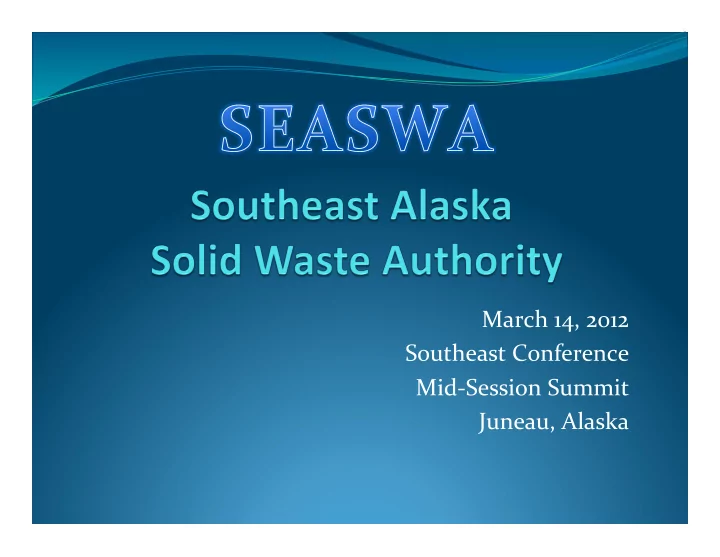

March 14, 2012 Southeast Conference Mid‐Session Summit Juneau, Alaska
SEASWA Background Regional Solid Waste Management Authority Act passed in 2006. Current members include Craig, Klawock, Petersburg, Thorne Bay, Wrangell – and new members in 2011, Coffman Cove and Kasaan.
Introduc2ons: SEASWA Board of Directors Karl Hagerman, Petersburg – Chair Carl Johnson, Wrangell – Vice Chair Jon Bolling, Craig Wayne Benner, Thorne Bay Leslie Isaacs, Klawock Audrey Escoffon, Kasaan Allen Thompson and Misty Fitzpatrick, Coffman Cove
SEASWA: Goals To provide environmentally sound and cost‐effective management of solid waste on a regional level. To protect the public health, safety and welfare. To improve the environment within its boundaries. To recover resources and energy as practical. To create jobs where possible.
Selected Course of Ac2on Based on an RFQ/RFP process, the Board of Directors unanimously selected Republic Services to partner with creation of a regional solid waste disposal and recycling system. Republic Services has had a long term presence in Southeast Alaska shipping solid waste in partnership with Alaska Marine Lines and currently serves the communities of Ketchikan, Sitka, Petersburg and Wrangell. All solid waste is loaded into containers and barged to Seattle, where is it transferred to rail and transported to the Roosevelt Regional Landfill in Klickitat County, Washington.
Southeast Alaska Solid Waste: Reality Check The volumes of solid waste in Southeast Alaska do not create an economy of scale for its disposal. Landfill development is difficult and expensive – meeting regulatory/permitting requirements in a high rainfall region. Many new technologies are being developed, but none offer commercial viability and practicality for our region. Capital dollars are hard to come by for this purpose.
Republic Services – Advantages of the trans‐shipment model It is a proven system. Long term cost stabilization for customers. Taps into economies of scale that already exist in Northwest. Ease of implementation. Long term environmental liabilities and risks have been addressed. Takes advantage of existing solid waste infrastructure which lessens initial capital costs. Is not impacted by severe weather conditions. Does not depend on unproven technology for success.
Project Research SEASWA has completed a regional resources survey, a landfill development cost estimation model and an evaluation of Wrangell’s Incineration Study. SEASWA initiated an RFQ/RFP process to gauge qualifications and interest of solid waste companies to provide services to SE AK.
Request for Qualifica2ons Process Request for Qualifications distributed in Spring of 2011. This process cast a wide net to seek Statements of Qualification from any manner of solid waste disposal companies and/or technology. The top three companies that were selected by the Board are the three largest solid waste companies in our nation: Allied Waste, Waste Connections and Waste Management. The top three selections were invited to participate in a more detailed Request for Proposal process.
Request for Proposals Process RFP focused on specific project proposals. Two proposals were received. SEASWA Board conducted a detailed evaluation process that included interviews at both company’s Seattle/ Tacoma offices and recycling facilities in mid‐December. The interview committee provided a full report and recommendation to the SEASWA Board in January 2012.
Next Steps for SEASWA Identify interested communities. Work with Republic Services to provide prospective rate and infrastructure information to decision makers. Assemble a Development Plan according to the SEASWA Enabling Ordinance. Development Plan will address comprehensive regional strategy for solid waste disposal, recycling and promotion/education. Seek SEASWA member approval of Development Plan.
SEASWA Membership Membership is growing. The Authority can assist your community in providing information to your Elected leaders and the voters. Contact any SEASWA Board member to find out more about membership.
Please Join Us! Next meeting: Today, March 14, in the Miller Room at 10:00 am. Solid Waste Roundtable discussion Thursday morning. Bring your questions and talk to the Board and Matt Henry of Republic Services. Monthly meetings by teleconference, third Friday of each month at 10am. Contact any Board member for more information. All interested parties are encouraged to listen in, ask questions and provide their insight and input to the Board.
Thank you Questions?
Recommend
More recommend